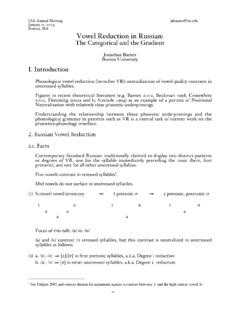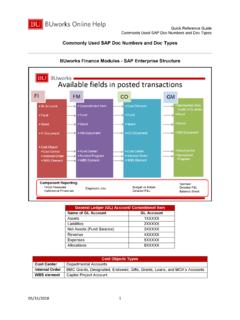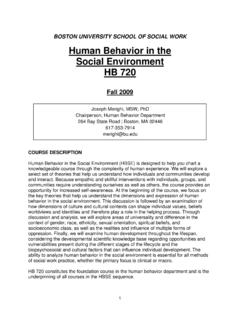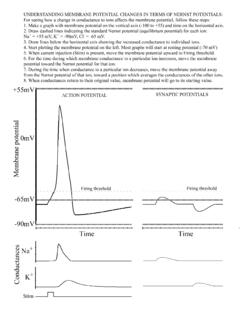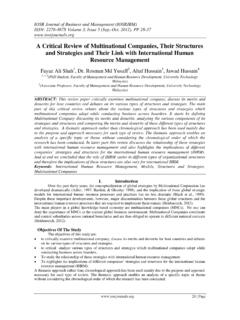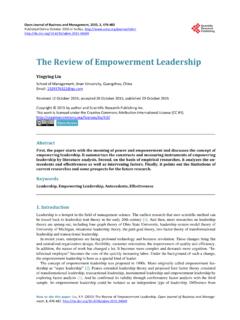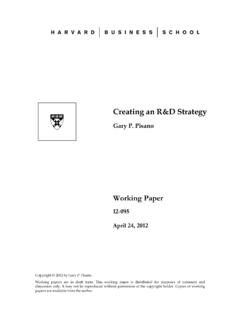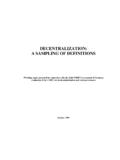Transcription of Are Federal Systems Better than Unitary Systems?
1 A r e F e de r al S y s t e ms B e t te r t h an Un i t ar y S y st e ms ? ABSTRACT Much has been written about the putative virtues and vices of Federal and Unitary Systems of government, but little empirical testing of the impact of such Systems on the quality of governance has been conducted. Do Federal or Unitary Systems promote Better social, political and economic outcomes? The paper takes up a series of theoretical debates put forth by advocates of federalism, including competition among subnational governments, fiscal federalism, veto points, accountability, and the size of government. In each case, there is room for doubt about the practical impact of federalism on governance. The paper then conducts a series of cross-national empirical tests over several decades of the impact of Unitary Systems on fifteen indicators of political, economic and human development.
2 In most cases, a strong empirical relationship between unitarism and good governance obtains. To the extent that these constitutional structures make a difference, Unitary Systems appear to hold distinct advantages over Federal ones. John Gerring Boston University Department of Political Science 232 Bay State Road Boston MA 02215 617-353-2756 Strom C. Thacker Boston University Department of International Relations 152 Bay State Road Boston MA 02215 617-353-7160 Carola Moreno Boston University Department of Economics 270 Bay State Road Boston MA 02215 DRAFT: Please do not quote or cite without authors permission. Comments welcome! June 22, 2007 2 decentralization is, quite possibly, the dominant political trend of our time. Significant devolutions of authority from national to subnational levels have occurred in Africa ( , Cote d Ivoire, Ghana), Asia ( , Bangladesh, India), Europe ( , Belgium, Britain, France, Italy, and Spain), and Latin America ( , Argentina, Colombia, and Mexico).
3 1 Several new democracies have emerged with explicit constitutional guarantees for sub-state authorities ( , Russia and the European Union). Meanwhile, older Federal polities such as Germany, India, the United States, and Switzerland continue intact. We are aware of no democracy that has moved from the constitutional status of federalism to that of its contrary, unitarism. As a consequence, most large democracies (calculated either in population and/or land area) are now constitutionally Federal . Indeed, over 56% of the world s democratic citizens (those living in states with multi-party competition) live in Federal polities at the outset of the twenty-first century. In addition to a political fact on the ground, decentralization is an idea, and an increasingly popular one at that. At mid-century, the three dominant models of development socialism, export-oriented industrialization, and import substitution all featured a leading role for the national state.
4 Big projects under central-state direction would pave the way for economic and human development in the third world. Now, the focus has shifted to local-level initiatives, micro-enterprise, NGOs, and the fostering of democratic institutions. The current vogue of decentralization is echoed in academic work by most economists and political scientists. Indeed, scattered evidence suggests that academics, politicians, and policymakers from across the political spectrum have embraced decentralization as a key to good governance. While the Old Right defended the prerogatives of the state, the New Right is stridently antistatist, preferring local democracy, entrepreneurial ( democratic ) capitalism, and constitutionally guaranteed property rights. On the Left, the centralist model associated with socialism and communism is increasingly under attack. In its place one finds renewed interest in democracy, accountability, citizen participation, civil society, social capital, and deliberation.
5 Thus, the appeal of decentralization cuts across the usual left-right cleavage. Before endorsing the decentralized model of governance it behooves us to probe its conceptual underpinnings and empirical patterns more thoroughly. Despite widespread enthusiasm, relatively little research has attempted to probe critically the theory of decentralism or to test systematically the policy impact of decentralized Systems of governance. In this paper we focus on one aspect of decentralization , the constitutional choice between Federal and Unitary structures of government. This feature of politics may or may not be emblematic of other aspects of the centralization / decentralization debate. Indeed, we surmise that constitutional decentralization is quite different, in purpose and in effect, from administrative or fiscal decentralization . In any event, the constitutional status of a polity is a central feature of its governance apparatus and thus a central feature of the overall debate, both empirically and theoretically.
6 1 Bird and Vaillancourt (1998), Crook and Manor (1998), Elazar (1996), Montero and Samuels (2003), Rodden, Eskeland, and Litvack (2003). 3 We begin this paper with a review of federalist theory, the dominant normative theory of governance in our time. We argue that there are a priori reasons to doubt the efficacy of decentralized constitutional structures. In the second section of the paper we proceed to an empirical examination of this constitutional question. Here, we examine three broad policy areas political development, economic development, and human development operationalized across fifteen governance indicators. For each measurable outcome, we conduct crossnational tests in order to determine whether Federal or Unitary regimes are associated with Better governance, controlling for other relevant factors. Our findings suggest that constitutional centralization leads to Better governance, particularly in economic and human development.
7 Contrary to most of the literature on this topic, we argue that there is a policy payoff to Unitary Systems . THE NORMATIVE THEORY OF FEDERALISM Unitarism is distinctly out of favor, so much so that there is no well-defined theory supporting a Unitary vision of governance. Consequently, our theoretical discussion focuses on its polar opposite, federalism, where there is a venerable, albeit diverse, theoretical tradition to draw upon (for general surveys see Bakvis and Chandler 1987; Beer 1963; Davis 1978; Elazar 1995; Forrest 1988; Karmis and Norman 2005; Mogi 1931; Ornstein and Coursen 1992; Wachendorfer-Schmidt 2001; Watts 1999; Wheare 1963). A constitution is Federal , writes William Riker (1964: 11), if 1) two levels of government rule the same land and people, 2) each level has at least one area of action in which it is autonomous, and 3) there is some guarantee (even though merely a statement in the constitution) of the autonomy of each government in its own sphere.
8 Following Riker, we understand this binary concept (federalism/unitarism) to refer to the constitutional features of a polity, not its administrative or fiscal arrangements. Thus, when we label a polity Unitary we are saying that constitutional authority sovereignty is vested in the central (national) government, not that all decision-making occurs at the center or all money is raised or spent at the center. The crucial distinction is that power delegated from national to subnational bodies in a Unitary polity may be retrieved. In a Federal system, by contrast, regional authorities enjoy constitutional status; their power is inherent rather than delegated. (In the following discussion, we use the terms subnational unit, region, state, and territory interchangeably.)2 A panoply of diverse arguments has been offered to vindicate the federalist vision of good governance. Arguably, decentralist theory is more a series of interrelated arguments than a single, coherent theoretical apparatus.
9 In any case, space constraints compel a selective treatment of these arguments. We 2 Granted, there are instances in which Unitary countries federalize, so this is not an entirely exogenous factor. However, there is greater stickiness to this constitutional status than is evident in most purely administrative or fiscal policies. 4 focus on causal claims that have plausible ramifications for a wide range of policies and policy outcomes. We treat arguments that are more narrowly focused , on one specific policy domain in cursory fashion, or not at all. Note that although the theoretical literature on federalism and decentralization is vast, a handful of relatively general, abstract claims recur. These concern a) competition among subnational governments, b) fiscal federalism, c) veto points, d) accountability, and e) the size of government.
10 These are the core features of a nascent, normative theory of democratic federalism. Each of these mechanisms should have repercussions for a wide range of public policies; they are not limited to policies of a specific type. The remainder of this section presents, quite briefly, each of the arguments. (Although some of these arguments were originally developed in the context of debates over fiscal or administrative policy, they are nonetheless often applied to debates over constitutional structure and are thus relevant to the present discussion.) We endeavor to show here why there might be reason to doubt the conclusions put forward by the proponents of federalism. Our purpose here is not to present an opposing theory, a normative theory of unitarism. Rather, it is to call into question a fairly entrenched consensus among scholars and policymakers and to motivate the empirical tests to follow.

